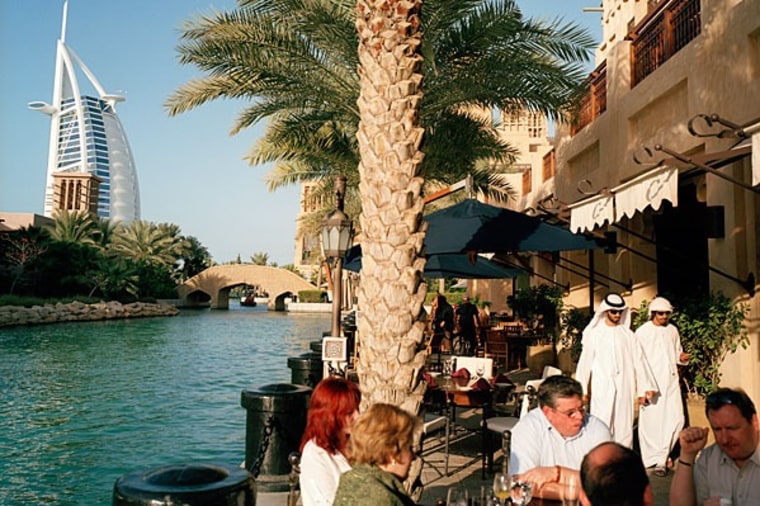To paraphrase Benjamin Franklin: The only things certain in life are death and taxes. And sure enough, millions around the world file taxes every year.
Personal income taxes are a huge source of revenue for governments globally, and the debate on taxes is a hot-button issue in the U.S. presidential election.
But, there are some countries where you can be 100 percent certain that you don’t have to pay income tax.
We’ve put together a list of eight countries that have no income tax, based on KPMG’s 2011 survey of 96 countries. Some of the countries are well-known tax havens, while others have managed to use natural resources to fund government expenses.
United Arab Emirates
The United Arab Emirates has one of the world's highest per-capita incomes, $48,200, and has no personal income or capital gains taxes.
Instead of generating revenue from income tax, the country, which is the third-biggest exporter of crude globally, is dependent on taxes from oil companies that pay up to 55 percent in corporate taxes. Foreign banks pay about 20 percent. Oil revenue, for example, accounted for 80 percent of consolidated government income in 2010, while income from various taxes, fees and customs duties made up less than 12 percent, according to government statistics.
While expatriate employees don’t pay for social security in the Arab country, UAE citizens must make monthly contributions of 5 percent of their total earnings for social security. Employers of citizens also have to make monthly contributions of 12.5 percent of the worker’s base salary for social security and pensions. Other indirect taxes include housing fees, road tolls and municipal taxes. The UAE charges a 50 percent tax on alcohol, and if a person has a liquor license and buys alcohol to drink at home, an additional 30 percent tax is charged.
The Bahamas
Among the wealthiest Caribbean countries, the Bahamas features an economy that's heavily dependent on tourism and offshore banking.
About 70 percent of government revenue comes from duties on imported goods. Even though there is no personal income tax, employees have to contribute 3.9 percent of their salary, up to a maximum of $26,000 annually, for a form of social security called National Insurance. Employers also have to contribute 5.9 percent of a worker’s salary for National Insurance, while self-employed individuals are charged 8.8 percent. The country also has a property tax of up to 1 percent.
Despite its prosperity as a financial center, The Bahamas has an unemployment rate of 15 percent and the political parties are feuding over oil exploration projects in its waters that could come at the cost of tourism.
Oman
Like neighboring Middle Eastern countries, Oman derives the majority of its revenue from crude oil.
The country’s oil revenues increased 35 percent in April to $8.49 billion compared to the same month last year and accounted for over 71 percent of the sultanate’s total revenues. Although, there is no individual income or capital gains taxes in Oman, citizens must contribute 6.5 percent of their monthly salary for social security benefits. A stamp duty of 3 percent is also charged on the purchase of property.
Despite its oil wealth, Oman has recently been rocked by a series of protests by residents demanding jobs and employment benefits. Several strikes at petroleum plants over pay and pensions have seen activists jailed in the biggest labor strife in Oman since protests last year against corruption and unemployment triggered by the Arab Spring. There’s growing resentment in the country over the jobs offered to 800,000 expatriates, while the unemployment rate for citizens was 24.4 percent in 2010 and is rising, according to the International Monetary Fund.
Cayman Islands
Well known as an offshore financial center, the Cayman Islands are a big draw for the wealthy with its zero personal income and capital gains taxes and because it has no mandatory social security contributions.
Employers, however, are required to provide a pension plan for all workers, including expatriates who have been working for a continuous nine months in the islands. While there is no value added tax or government sales tax, the country does have some indirect taxes such as import duties, which can range up to 25 percent.
A high standard of living in the Caymans also means high property prices. The average cost of an apartment in April was over $550,000, while the average cost of a house was more than $736,000, according to government figures.
Kuwait
As the world’s sixth-largest oil exporter, Kuwait’s oil revenue of $63.5 billion between April and November of last year, accounted for 95 percent of the government’s total revenue in the period.
While there is no income tax in the country, Kuwaiti nationals must contribute 7.5 percent of their salary for social security benefits; their employers make an 11 percent contribution. Despite being one of the world’s wealthiest countries per capita, strikes and protests by public sector workers unhappy about pay have led the government to introduce a 25 percent increase in wages. The IMF, however, warned Kuwait in May that such spending could impact the sustainability of its public finances . Only 7 percent of Kuwaitis work in the private sector, and the rising cost of retirement could put pressure on government spending.
Kuwait is no stranger to political turmoil, ushering in four new parliaments in the past six years. The country has been marred with corruption scandals implicating key political figures, while poor parliament-government relations have hampered policymaking. The IMF has recommended that Kuwait introduce a value-added tax and comprehensive income tax system.
Read more of the countries with no income taxes at CNBC.com.
